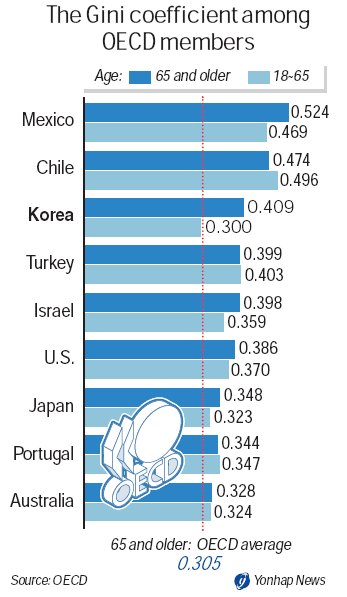
Financial disparity among those over 65 third highest in OECD
Korea had the third-highest income inequality among senior citizens in the Organization for Economic Cooperation and Development, a report by the organization said.
The Gini coefficient ― a measure of income inequality ― of people aged 65 or older in Korea, measured after tax, was 0.409, behind Chile (0.474) and Mexico (0.524). The closer a Gini index is to 1 the greater the income inequality.
The Gini coefficient among Koreans aged between 18 and 65, however, was 0.3, lower than the OECD average of 0.311.
“The large gap in the Gini index between Korea’s working generation and senior citizens shows that we have scant post-retirement pension funds and that there is a major welfare dead zone,” a Finance Ministry official said.
“The government is making various efforts to encourage personal pension subscriptions and improve post-retirement income security.”
The United States showed the sixth-highest Gini index for senior citizens ― 0.386 ― followed by Japan’s 0.348. France and Germany marked 0.291 and 0.284.
Income inequality among senior citizens was lowest in the Czech Republic ― 0.188.
The OECD’s average after-tax Gini coefficient for people aged 65 or more was 0.299.
As for those aged between 18 and 25, Korea’s income inequality was the 18th highest among the 34 OECD nations.
Chile showed the highest at 0.496, followed by Mexico (0.469), Turkey (0.403), the United States (0.37) and Israel (0.359).
The Korean government on Wednesday announced a revised population estimate, signaling major changes in its socioeconomic policies including the national pension fund policy.
The country’s population will peak at 52.16 million in 2030 and decline to 43.96 million in 2060, Statistics Korea said, revising its earlier projection that the peak will be in 2018.
This means the national pension fund could run dry two years earlier than the previously estimated 2060.
The average life expectancies in 2050 for men and women were raised from 82.9 and 88.9 to 85.1 and 89.3, respectively, in the statistics agency’s new estimate.
By Kim So-hyun (
sophie@heraldcorp.com)








